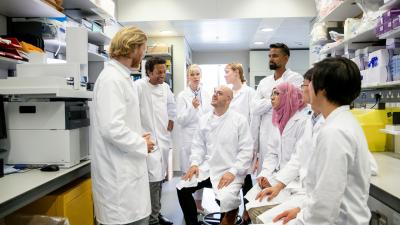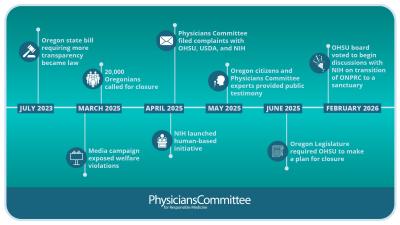FDA Appropriations Language Supports Horseshoe Crab Protection

Congress just gave the FDA a meaningful directive that would help replace the use of horseshoe crab blood in pharmaceutical testing, strengthening the medical supply chain and patient safety, while also protecting horseshoe crabs and their ecosystems.
Yearlong funding for the FDA became law this week, along with the continuing resolution that reopened the federal government. The Physicians Committee advocated for language included in this funding agreement directing the FDA to make important policy updates to better implement nonanimal replacements for a critical safety test in pharmaceutical manufacturing.
Every batch of injectable medical products must be safety tested to be free of dangerous bacterial contaminants, called endotoxins. The default test that the FDA has accepted for decades in guidance uses blood from horseshoe crabs. Relying on horseshoe crab blood for this critical safety test not only harms these animals, as they are transported and bled, but also creates supply chain insecurity as horseshoe crab populations dwindle. In addition, their use in testing threatens coastal ecosystems and migratory birds that depend on this keystone species.
However, there are now multiple commercialized synthetic testing methods that avoid the use of animals altogether and are shown to be scientifically reliable and scalable in the lab. But, as is often the case, policy has lagged behind scientific developments.
In addition to the FDA, the U.S. Pharmacopeia, an organization responsible for setting national safety standards used in medical product manufacturing, is a key player in implementing synthetic endotoxin test methods. After years of advocacy by the Physicians Committee and other groups, in 2024, the U.S. Pharmacopeia added a new chapter with industry-standard information on synthetic endotoxin test methods. This change marked a pivotal shift in support of nonanimal approaches, but the FDA’s relevant policy has not been updated since 2012. As such, synthetic approaches are not viewed on an even playing field with the default-accepted horseshoe crab method under FDA guidance, creating unwarranted regulatory burden for companies that wish to use alternatives to horseshoe crabs.
With the passage of this FDA appropriations bill, Congress is directing the agency to update its 2012 guidance on endotoxins testing within one year to include acceptance of synthetic methods in the manufacturing of new and existing products, and to provide staff training in these modern approaches. Congress is also recognizing the many scientific, economic, supply chain, environmental, and animal protection benefits that these synthetic approaches provide.
The Physicians Committee worked closely with members of Congress to include this strong directive to the FDA. It clearly states that the FDA is expected to make this policy update in support of more widespread adoption and acceptance of superior nonanimal methods, which will help increase industry’s confidence to replace the use of horseshoe crabs.
Global momentum for this shift is strong—Europe has accepted synthetic methods for years, and Brazil is moving to ban the horseshoe crab test entirely. As more companies make the switch to animal-free endotoxin testing, the Physicians Committee looks forward to supporting this transition through our continued work with Congress and the FDA and ensuring alignment with international regulatory partners.







